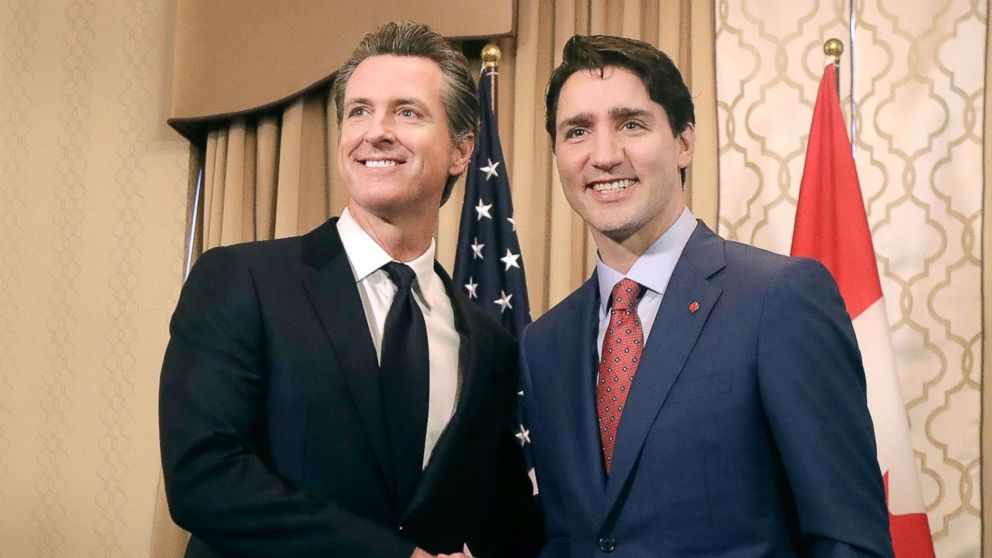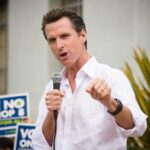Blog Post
California Governor Gavin Newsom–and other politicians–want to use the coronavirus pandemic to “reimagine a progressive era”
By Jonathon Van Maren
As government measures to contain the coronavirus become increasingly draconian—in Canada, people are now getting fined $1,000 apiece if there are more than two people from different addresses in the same vehicle—some are beginning to wonder where this all ends. British columnist Peter Hitchens, predictably, is swimming upstream of accepted opinion, asking whether the wholesale surrender of liberties is the right response. Over at National Review, Michael Brendan Dougherty (who agrees that these measures are temporarily necessary) wrote a thoughtful piece titled “Let’s Never Get Used to This”:
In Britain there is a reported surge of citizens snitching on each other, self-righteously calling the police to turn in neighbors who exercise outside more than once a day. Tabloid newspapers print large photographs of everyday people shopping and ask their readers if they think the action depicted was really necessary. Police in Darbyshire used a drone to film hikers taking legal exercise (even this phrase is sinister), then publicized the video on social media and encouraged a spasm of public outrage at those not sheltering in place. The same police also poured black dye into a lagoon to deter hikers who might take selfies in it. Now, even pollution is necessary for public health and safety.
European countries such as Germany are considering handing out antibody certificates, which would allow one to move about freely if he had provably survived the virus and could demonstrate some immunity. One can see the logic of a measure like this, but it is a logic that vitiates freedom: One’s physical presence in normal life is presumed to be so potentially toxic and dangerous that it is preemptively disallowed. The unintended consequences of this are easy to imagine.
It is genuinely surreal to consider how quickly we went from a normal society to nations on lockdown, how swiftly our freedoms were eliminated–and how swiftly everyone gets used to an extraordinarily bizarre new “normal.” I agree with Dougherty that these measures seem necessary for the time being, and like many others am working from home—but it still seems as if each new day brings something else that the 2019 versions of ourselves would have scoffed off as impossible in the West. In London, Ontario, for example, a separate phone line has already been set up so that people can report on each other if they appear to be ignoring the social distancing guidelines, a “We’re All In This Together” snitch-line. Necessary? Maybe. Sinister? Definitely.
I am very concerned that progressive politicians who cannot gain support for their dramatic reordering of society at the ballot box may attempt to utilize these unique circumstances to implement their agenda. Many climate activists, chronically incapable of reading a room, have already demanded to know why, if governments can shut down whole societies to fight COVID-19, they cannot do the same for climate change. For the time being, everybody is ignoring them. The culture wars are still ongoing, too–the New York Times ran an op-ed earlier this week blaming evangelicals for inflicting “coronavirus hell” on America, and State senator Brad Hoylman, who is gay, responded to Samaritan’s Purse setting up a relief hospital in New York’s Central Park by telling NBC News that it is “a shame that the federal government has left us in the position of having to accept charity from such bigots.”
We’ve already seen the totalitarian instincts of many progressives on display here in Canada, where Justin Trudeau—who leads a minority government—attempted to take advantage of the COVID-19 crisis by seizing power for up to two years, giving his government the power to tax and spend without the approval of Parliament. This attempt was shut down by the opposition parties, but nobody really doubts that if Trudeau had still been in possession of a parliamentary majority, that he would have legislated his Liberals near-total power already. For progressives, opposition is a nuisance to be dispensed with.
California governor Gavin Newsom was perhaps a bit more honest than he intended yesterday when a reporter asked him point blank whether he planned to use this crisis to further his political agenda: “Many aspects of policy have taken place, changes of policy have taken place that I think a lot of people have found surprising,” the reporter said, citing unemployment benefits and a ban on corporate stock buybacks. “I’m wondering if you see the potential, as many others in the party do, for a new progressive era and opportunity for additional progressive steps?”
Newsom, recognizing danger, circled the question, but then finally came out and said it: “Yes. There is opportunity for reimagining a progressive era as it pertains to capitalism,” Newsom said. “Forgive me for being long winded but absolutely we see this as an opportunity to reshape the way we do business and how we govern.”
And there we have it. Progressives do not believe in wasting crises, and even if the public has temporarily granted sweeping powers to the government to halt a pandemic, it is essential that we remain vigilant. As Trudeau proved, and Newsom indicated, these leaders will be looking for opportunities to reorder society—and thus, as Dougherty pointed out, it is important that we never, ever get used to this.









I’m sorry, Jonathon, but you’re so deeply tied to conservative ideology, you can’t see benefits in some progressive ideas.
For example, a ban on corporate stock buybacks for bailed out companies. What is the point of a stock buyback? Only to raise the stock price. What is the point in raising the stock price? Well, normally corporate C-Suite executives have bonuses tied to stock prices.
There are two ways to increase stock price: 1) add value to the company or 2) limit supply. Stock buybacks artificially limit supply by using the corporation’s cash to buy the stocks.
Who does this benefit? C-Suite executives and, possibly, rich stockholders.
So, if you bail out a corporation and it buys back stocks, the bailout money (YOUR tax money) is funneled to the C-Suite executives and not used to keep the corporation a going concern, pay bills or pay employees.
If you can’t see that is a good restriction …
Furthermore, do you disagree that the following excerpts from the New York Times OpEd you mentioned show a poor reaction to the crisis:
“On March 15, Guillermo Maldonado, who calls himself an “apostle” and hosted Mr. Trump earlier this year at a campaign event at his Miami megachurch, urged his congregants to show up for worship services in person. “Do you believe God would bring his people to his house to be contagious with the virus? Of course not,” he said.
Rodney Howard-Browne of The River at Tampa Bay Church in Florida mocked people concerned about the disease as “pansies” and insisted he would only shutter the doors to his packed church “when the rapture is taking place.” In a sermon that was live-streamed on Facebook, Tony Spell, a pastor in Louisiana, said, “We’re also going to pass out anointed handkerchiefs to people who may have a fear, who may have a sickness and we believe that when those anointed handkerchiefs go, that healing virtue is going to go on them as well.””
It’s also quite interesting how removing the context from Gov. Newsome’s comments:
“CALIFORNIA GOVERNOR GAVIN NEWSOM: You know we’ve had some very deep policy conversations in this space now for weeks let us remind which despite the fact that California was running a historic economic output in terms of our GDP growth, in terms of our net, well from job creation to low unemployment, to record reserves, surpluses. The wealth distribution, the income inequality, was not something that was substantially improving and that’s the case across the rest of the world. As IT and globalization detonate at the same time you’re seeing that concentration and fewer and fewer hands, the middle-class feeling squeezed increasingly, the trend lines were suggesting what is self-evident become a headline and that is we were going from a three class society to a two class society, so something was fundamentally flawed in that global context manifested quite acutely here in the state of California, the richest and the poorest state where the number of the most impoverished metros in the country and we long been struggling to address those issues.
So, I see this quite substantively through that lens, that equity lens, looking at those folks that never fully recovered and you look at medium wages for folks coming out of 2008, 2009 in the Great Recession that haven’t fully recovered even today that are struggling. And so, what is going to happen to those folks in this current crisis and what’s the opportunity to your question for reimagining a more progressive era as it relates to capitalism? And I’m a capitalist, I’m a small business owner, I’m a job creator, my customers are the job creators, I’m beneficiary of their support and that helps build that demand that allows me to hire more people and so as a former business owner, now governor, I have had that experience and I have that appreciation of the importance of consumer confidence, consumer spending, in a vibrant middle class and so yes, forgive me for being long-winded, but absolutely we see this as an opportunity to reshape the way we do business and how we govern.
And that shouldn’t put shivers up the spines of you know one party or the other. I think it’s an opportunity a new for both parties to come together and meet this moment and really start to think more systemically, not situationally, not just about getting out of this moment, but more sustainably and systemically to consider where we can go together in this historic moment if we meet it at a national level, in a state, and sub-national level. So, the answer is yes.”
Importantly … “but absolutely we see this as an opportunity to reshape the way we do business and how we govern.
And that shouldn’t put shivers up the spines of you know one party or the other. I think it’s an opportunity a new for both parties to come together and meet this moment and really start to think more systemically, not situationally, not just about getting out of this moment, but more sustainably and systemically to consider where we can go together in this historic moment”
He’s not talking about re-ordering society in line with only “progressive” ideals … he wants to re-order society to make it work for everyone!
I’m actually not tied to a traditionally conservative lens. You may have read my reports from the National Conservatism conference last summer–I’m quite supportive of the idea of an economy geared toward the middle class, a national industrial policy, and quite frankly, much of what you say in your comment. I’ve written at least a half dozen articles on how Big Business and the corporations are, at this point, the enemy of social conservatives, as well. So there’s more agreement than you’d think, especially in regard to your conclusion.
The reason I cited those two politicians rather than other examples I could have chosen from is because I specifically do not trust their motives, and their willingness to do whatever they wish is renowned (Newsom began disregarding the law re: same-sex marriage because he didn’t like the law, Trudeau is the first PM of Canada to be convicted to ethics violations twice.) But perhaps I should have made that point clear.
Thanks for the response, Jonathan. I appreciate the background!
I am curious about Trudeau’s two year time period as well – it’s puzzling to me that he would throw away the good will garnered throughout the crisis in favour of a political power grab. I wish he would have given a straight answer for why he sought the two year time period! It might be possible that modelling suggested that or he was thinking of the 1918 Spanish Flu that lasted until 1920, but he didn’t answer and we can therefore only assume a power grab.
Oh, and in regard to those pastors breaking the law to gather: I agree with David French and Rod Dreher, who note that those pastors are making Christians look very, very bad with this nonsensical bravado.
This is fair comment Sam. Thanks for the context. I generally err on the side of suspicion when it comes to how “progressive” politicians implement ideas like these, but the quote you provide is more balanced than Jonathan’s headline suggested.